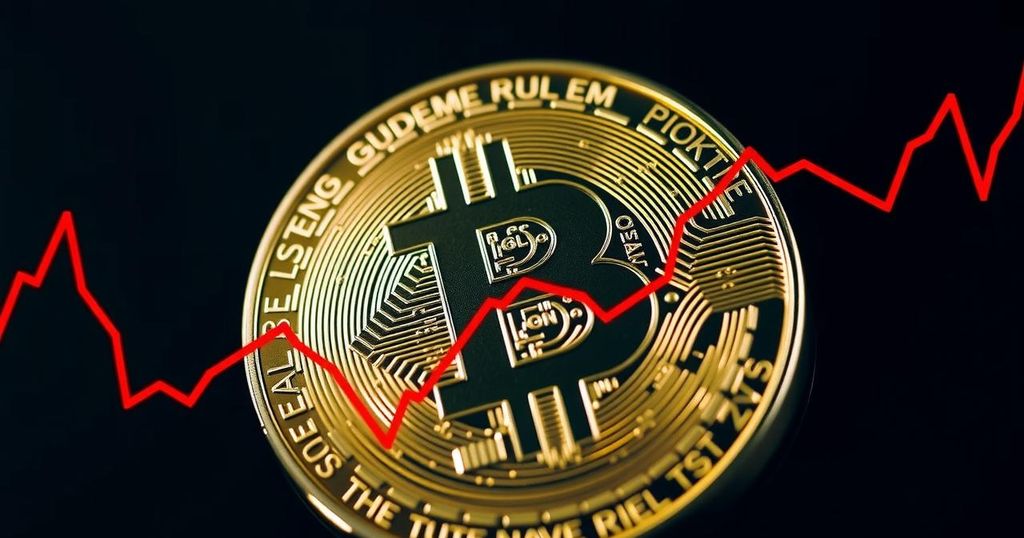Bitcoin Price Decline Amid Election Uncertainty and Economic Pressures
Bitcoin’s price fell to $67,412.5, retreating from three-month highs amid election uncertainties and increasing risk aversion as the U.S. presidential election approaches. Speculative optimism surrounding a Trump victory has waned due to a tighter race against Harris. Concurrently, rising interest rate expectations further pressured cryptocurrencies alongside a strong dollar.
On Tuesday, Bitcoin experienced a decline, retreating from recent three-month highs amid a cooling crypto rally influenced by an overarching sense of risk aversion as the U.S. presidential election approaches. Initial speculation surrounding a potential Donald Trump victory had previously catalyzed a surge in cryptocurrency prices. However, recent polling indicates a competitive race against Vice President Kamala Harris, leading to diminished risk appetite among traders. Consequently, risk-sensitive assets across various markets faced declines, including the cryptocurrency sector. In addition, the strengthening of the U.S. dollar contributed to the downward pressure on cryptocurrency values, while investors gravitated towards safer investments such as gold, which has reached record highs. By 00:49 ET (04:49 GMT), Bitcoin’s price had fallen by 2.4%, settling at $67,412.5. The cryptocurrency had seen a peak near $69,000 but could not surpass the psychologically significant $70,000 threshold, which many believed would indicate a bullish trend. The uncertainties surrounding the upcoming U.S. elections have significantly impacted Bitcoin’s performance, particularly as the elections are only two weeks away. Previously, improved chances for Trump’s candidacy had underpinned recent increases in cryptocurrency prices due to his pro-cryptocurrency policy stance. In contrast, remarks by Harris in regard to potential regulatory frameworks for cryptocurrencies had also supported market sentiment. Nevertheless, analysts are now attuned to the 2024 election as a tightly contested affair, thereby amplifying uncertainty in risk-oriented markets which has prompted traders to favor safe-haven assets like gold and the dollar. Current prediction markets suggest a leaning towards Trump, with Polymarket indicating a 63.7% probability of his victory against Harris’s 36.4%. Additionally, Bitcoin and other speculative assets are facing downward pressure due to growing expectations that the Federal Reserve will moderate its pace of interest rate cuts in the coming months. This outlook has propelled the dollar to near three-month highs and has driven bond yields upwards, further challenging risk-sensitive investments. Traders have begun to accommodate forecasts for a heightened terminal rate set by the Fed. The broader cryptocurrency market followed Bitcoin’s lead, experiencing declines across several other major currencies. Ether, the second-largest cryptocurrency, fell by 3.5% to $2,642.39. Other altcoins, including SOL, ADA, and MATIC, experienced losses ranging from 1.5% to 3%, while XRP decreased by 0.9%. Among meme cryptocurrencies, DOGE saw a decline of 1.2%.
In recent weeks, Bitcoin, the preeminent cryptocurrency, had witnessed a noteworthy increase in its value due to speculative activity tied to the upcoming U.S. presidential election. The election’s unpredictability, particularly related to the prospects of Donald Trump, had initially spurred interest and investment in cryptocurrencies. However, evolving poll results reflecting a more competitive race against Kamala Harris have resulted in a retreat in investor confidence, causing price corrections not only for Bitcoin but for the cryptocurrency market as a whole. Furthermore, macroeconomic factors, such as discussions surrounding Federal Reserve interest rate policy and the strength of the U.S. dollar, have introduced additional headwinds for cryptocurrency valuations.
In summary, the recent downturn in Bitcoin’s price is largely attributed to a combination of election-related uncertainties and macroeconomic pressures. Predictions surrounding the outcome of the U.S. presidential race have shifted market sentiment, leading to reduced risk appetite among investors. Simultaneously, expectations of a slower rate of interest rate cuts from the Federal Reserve have compounded challenges faced by cryptocurrencies. As the political landscape remains turbulent and economic indicators evolve, market reactions will continue to fluctuate accordingly.
Original Source: www.investing.com







Post Comment